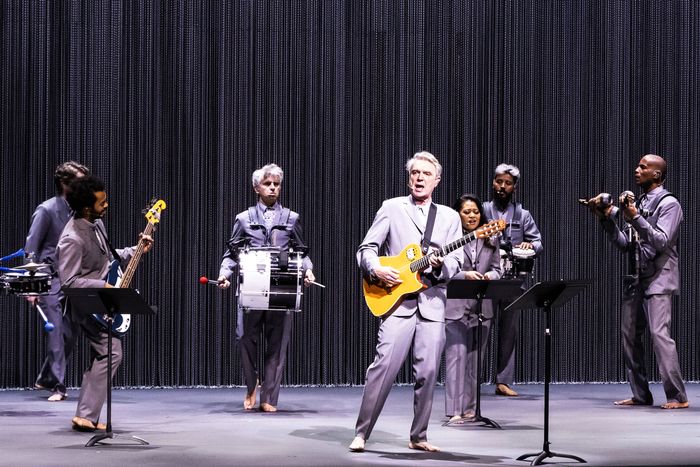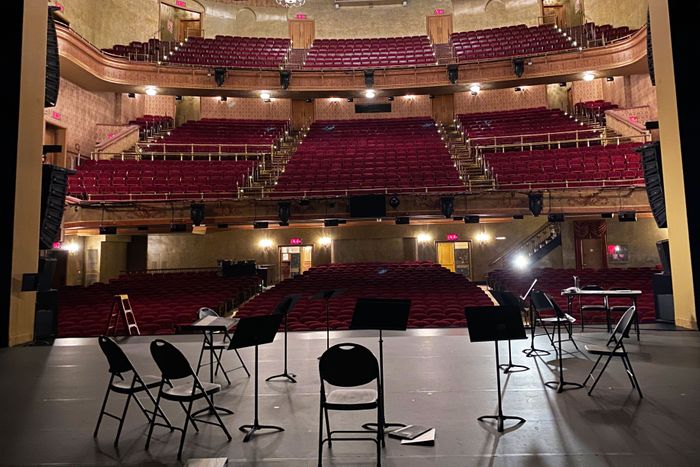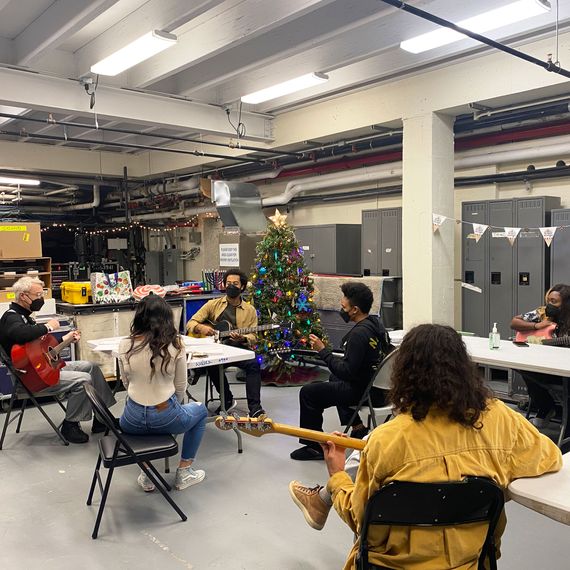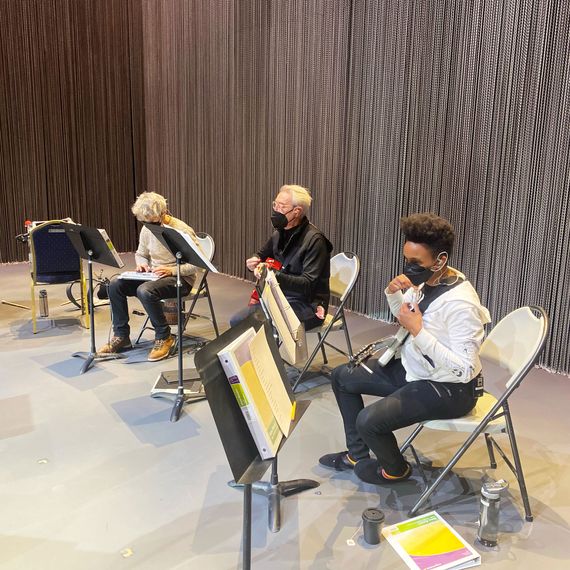
When the first wave of the coronavirus hit New York in early 2020, it shuttered Broadway indefinitely. Doors wouldn’t partially reopen until the summer of 2021, returning to full-scale only by October. Well, that “return to normal” was short-lived; by mid-December, both the city and state had logged a record number of positive cases, fueled by the arrival of Omicron. Broadway was starting to go dark again. Testing sites had hours-long waits. But American Utopia, despite its many temporarily fallen brethren in the Theater District, kept its lights on at the St. James, thanks to the creative ingenuity of its maestro, David Byrne, and musical director, Mauro Refosco: Working together remotely and in-person, the duo were able to reconfigure the show into an “unplugged” and “unchained” version on the fly that could successfully utilize their now vastly reduced crew. “It was a little chaotic,” Refosco recalls of the team’s early days before being presented with this alternate idea. “One by one, the cast started to get positive tests. It came to the point where there were no more understudies.” Would they still be able to perform 17 songs, hell, any songs, with half of the performers out?
What ensued was a legitimately once-in-a-lifetime five-day slate of American Utopia shows, running from December 28 through January 2 — and marking perhaps the most exclusive series of performances Byrne has done since Stop Making Sense. (But unlike Stop Making Sense, these “unplugged” shows weren’t even recorded for posterity.) Old songs were out; new songs were in. The dominant instrument was the drums. The surprise inclusion of “Life During Wartime” had people dancing in the aisles, fire-marshal requests be damned. That any of this occurred at all, though, is what’s most remarkable, given the cast and crew had only a six-day head start. To learn more about the feat, Refosco walked Vulture through the preparations in the week after pulling it off, while Byrne rested up before the show reopens (plugged back in) on January 5.
December 23–25, preparations
David came to me and reminded me that we performed at Carnegie Hall a few years ago. It was very acoustic. It was just David playing guitar and singing, and I was playing a little percussion with him. He said, “We did this once, and there were some benefits, and we did it really well. Maybe we could do that again?” I was like, Wow, that would be amazing. We could use some of the songs that we already know from the show, and David has so many songs in his Talking Heads and solo catalogue. He was like, “Let’s do it. I’ll come up with a set list and send it to you tonight.” We started this communication for us to work back-and-forth. He set up a Dropbox and put in songs to create a set list. First it was a list of songs he was thinking about and then I started mapping the songs with the personnel that we had and the instruments they could play.
So on the 23rd, David sent an email that said, “Working on the set list. I’ll send it tomorrow in the morning.” I received it on the 24th at precisely 3 a.m. I spent Christmas Eve and Christmas Day working on that. He also sent it to our guitarist and bass player. We started working on the music on our own on those two days. I was doing the Christmas thing with my kids and also doing the music on my own. Once I had an arrangement for the songs, on Christmas Day, I sent it to the drummers.
December 26–27, rehearsals
We all met in person at the theater. We had a list of songs that we were planning to do, but not the order in which to do them. So we went song by song so David could refresh his memory on how to play them. He was going to play much more guitar; he basically played guitar for every song. He had to relearn a few things; it’s not like he’s playing those songs every day. The moment you step onstage, even if you’re feeling a bit insecure with the arrangement, it just comes to you. It comes out. You have to trust yourself and trust the group that it’s going to be great. David was super happy. The idea of singing songs that were different from the American Utopia set list got him excited. We had another song we tried out that we ended up not using — “Buck Naked,” one of his songs from 1994. We realized it didn’t really fit the set list.



We only had our essential crew in the theater with us. We had four drummers, one backing vocalist, a bass player, a guitar player, and David. We concentrated on the music. There was a lot to learn and achieve in such a short time. Because of union regulations, the rehearsals were really time constrained. We had three and a half hours in the afternoon, a dinner break, and then another three and a half hours in the evening. We had seven hours each day. David was in such good spirits. Patient zero, percussionist Gustavo Di Dalva, was scheduled to come back on the 28th, after his quarantine was over. So he was able to rehearse with us that day and perform with us at night. Patient two, vocalist Tendayi Kuumba, was able to come back on the 31st. It was nice that some people were able to return during those days.
December 28, opening night
We weren’t absolutely 100 percent sure how the arrangements would be, but it just comes to you. We had an afternoon rehearsal, and in that time, we went through the beginnings and endings of songs. How are we going to finish this? What instrument should have the last sound? We were more specific about the songs now. Once we did that, we went to our dressing rooms and got ready. On our first night, some people still had music stands to have a couple of notes to remember things. We had to. It was just too much to remember at the time. There were a few bumps in the road. David forgot some lyrics. One of the drummers forgot little breaks or parts. But it felt like making music. The audience understood that. They were getting something special. After the show, David was like, Actually, that went really nicely! He doesn’t pump fists or anything like that. I kind of did that with the drummers, just to give off the best vibes.
December 29–January 2, evolving
We had notes for one another. We kept the spirit of, We have to do this better. The stage is empty. We’re carrying the instruments. We were thinking in terms of, During this song the drummers can come down the stage, and, During this song the guitarists can go up the stage. The possibilities were so big. Even up to our last day, we were tweaking things. The one thing I insisted on was losing the music stands. David did by the second show. The drummers also, they all trusted themselves. They were all gone by Friday. It made us feel alive.
David mentioned that American Utopia is a reflection of what this country has been going through these past few years. But American Utopia: Unchained was a reflection of the week of what this country was going through. David could have easily been like, “Oh, yeah, let’s just call our show off for a couple of weeks and stay home and watch Netflix.” Instead, he was like, “We can do something else. Let’s try this and give it a shot.” That was the boost of leadership we all got from him.


